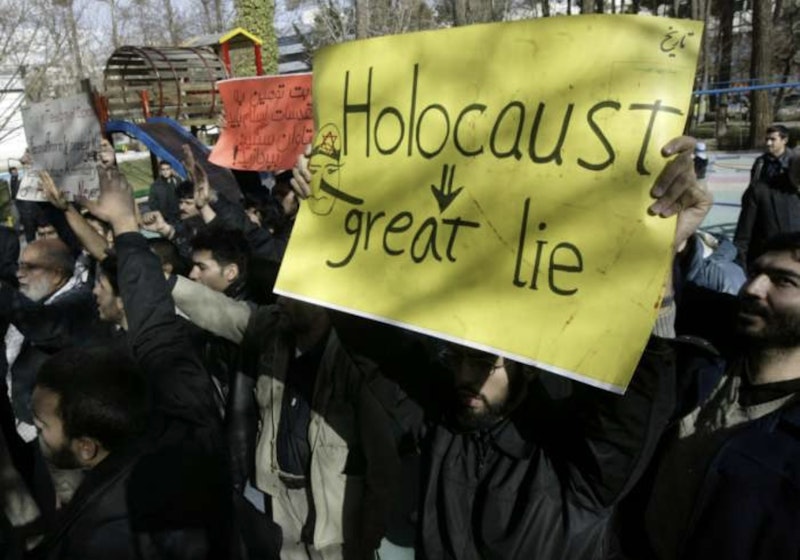Searches indicate that between February 4, 2022 and February 4, 2023, the word “denier” appeared 371 times in The Washington Post, and “denialism” 28. One reference, from February 2022, was to "vaccine denier" Joe Rogan; the rest, as far as I can tell, pick out people who claimed that various elections from Georgia to Arizona to Brazil weren’t fairly decided. “Election denier”appeared in dozens of opinion columns, in dozens of analysis articles, and in dozens of what were presented as news stories.
The New York Times has been eerily similar: 375 uses of “denier” in the past year, though it does use the term more multi-dimensionally, including references to “economy deniers”and “climate deniers.” "See which election deniers and skeptics won and lost in the mid-term elections," declared a "news" story from November 9. "Concussion deniers" appeared on October 26, in an article about pro wrestling. There were also a couple of references to "Holocaust denier Nick Fuentes."
Only that last use was traditional. The use of the word “denier” to name advocates of a particular position was devised as a wayto condemn people who claimed that the Holocaust was a “hoax” or that it included many fewer deaths than responsible history indicates. “Denialism” here had a very particular meaning that originated in the immediate aftermath of the war, indicating the attempt to conceal the most monstrous crimes ever perpetrated. Being a denier entailed negating the obvious truth, a terrible example of murderous anti-Semitic ideology and self-delusion.
“Denier,” always preceded by “Holocaust,” became a powerful trope by the 1960s. It was a way of insisting that the people concealing the crime were complicit in it, and intended to repeat it if they got the chance. A “denier” was a neo-Nazi, a liar, and potentially a murderer.
When the Post, the Times, and others describe people as “election deniers,” they appear to be giving a factual description. An “election denier,” however, isn’t someone who denies that an election took place. An “election denier” denies that the election was fair. The people that the editorial boards at the Post and Times regard as responsible, by contrast, hold that the elections were fair. Responsible people, that is, deny that the election was rigged. That something is being denied isn’t an issue or the problem: everyone denies something.
There’s exactly one reason that “denier” has caught on, one reason that the Post, Times, CNN, MSNBC, the Atlantic and NPR use “denier” on a daily basis: they seek to associate people with whom they disagree with the Holocaust. They’re trying to discredit the position of their opponents by associating them with the greatest crime ever committed. It's like calling someone you disagree with “Adolf,” let's say. It has no cognitive content.
It doesn’t convey anything about the position in question which could conceivably bear on the truth of that position. It’s a sheer insult. And they’re printing it over and over again in their news pages, continuously, ecstatically, triumphantly, like they just won something.
This is what Leonard Downie, the Post's former editor, really meant when he urged us all to go beyond objectivity: now we can tack a pejorative adjective onto every mention of these bad populists. However, everyone reading your paper already agrees with you, so you're not making any point, much less changing minds. You're just producing in-group solidarity by ridicule. This isn’t what you take yourself to be doing, I admit. The breakdown in self-awareness is vitiating to the journalism.
There are two reasons to apologize for and correct these 700 stories (thousands if we go for the last few years). One is that contentless manipulative hooey isn’t compatible with what these publications declare to be their mission. The other is this:randomly tossing “denier” and “denialism” at every position with which one disagrees minimizes the Holocaust.
Many people, especially many Jewish people, regard the Holocaust as a historically unique event, a crime out of proportion to all others, a challenge to history and humanity. The Holocaust is the very acme and emblem of human evil. Raising doubts about the vote count in Arizona might be reprehensible, but equating it to genocide is ridiculous.
Calling people who say that the election was rigged or doubt the efficacy of vaccines “deniers” is "Holocaust minimization." What sort of people want to minimize the Holocaust? Deniers, for certain, but also, evidently, everyone who covers politics at The Washington Post and The New York Times.
—Follow Crispin Sartwell on Twitter: @CrispinSartwell

